Score
































 / 23 of 33 hearts / Pretty Good
/ 23 of 33 hearts / Pretty Good
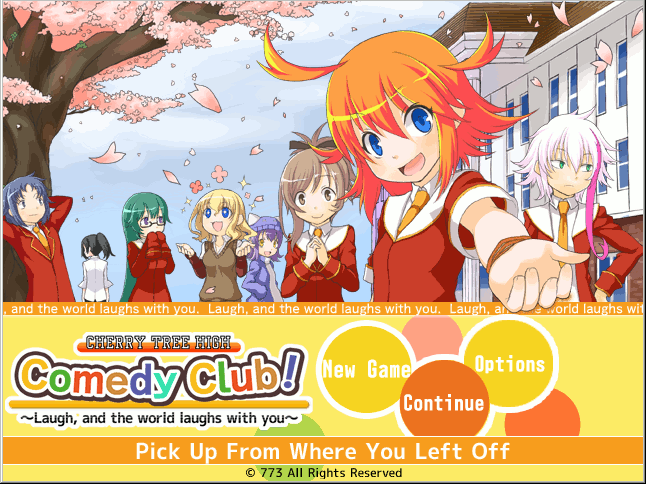
Let it never be said that I won’t try any kind of game. When the dust, smoke, and brimstone clears, some genres become my go-to favorites and others become my personal plague, but everything gets a fair spin. After more than twenty years of playing, though, Cherry Tree High Comedy Club has become the first game I’ve played that uses the dating sim style of gameplay—and it’s taken me so long because almost no one releases anything in this genre. CTHCC has no dating, but every other element is there: Cherry Tree High Comedy Club revolves around time management.
Our heroine Miley, seeking to recruit members for her startup comedy club, can perform three of the following actions each day: chatting up potential recruits to become better friends, learning about a variety of topics to become more effective at those chats, and earning money so that she can pay to learn about those topics. It’s a simple cycle, but the game dresses the activities up in different contexts; Miley can learn by watching movies, reading magazines, watching TV, visiting exhibits, or occasionally participating in the topic of choice—playing games makes her a more knowledgeable gamer while eating at a cafe makes her more knowledgeable about cooking.
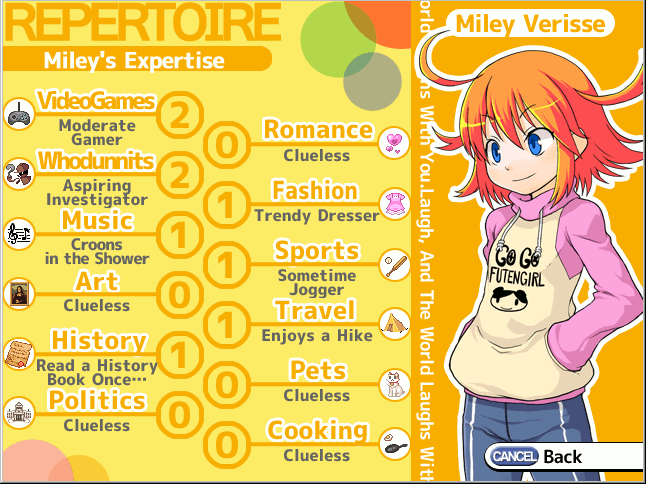
Cherry Tree High Comedy Club‘s biggest win is a lighthearted heroine with the strength of personality to drive the entire game.
One risk of setting games in something resembling our own world with a cast of everyday people is that gamers who are used to fantastical universes and events might be bored. Even a relatively tame world like Harvest Moon typically gives players a lofty goal because it can be difficult for some fans to root for a hero or heroine who isn’t out to accomplish the amazing.
Miley wants to start a comedy club and can’t do so unless she befriends at least three people in a month and a half. This seems like nothing special on the surface, but Miley’s exactly the protagonist this type of game needs: a playful girl who finds the fun in everything. Her perspectives make life seem like a grander adventure than the raw facts would make it out to be; I’d even say this game would be nothing without her.
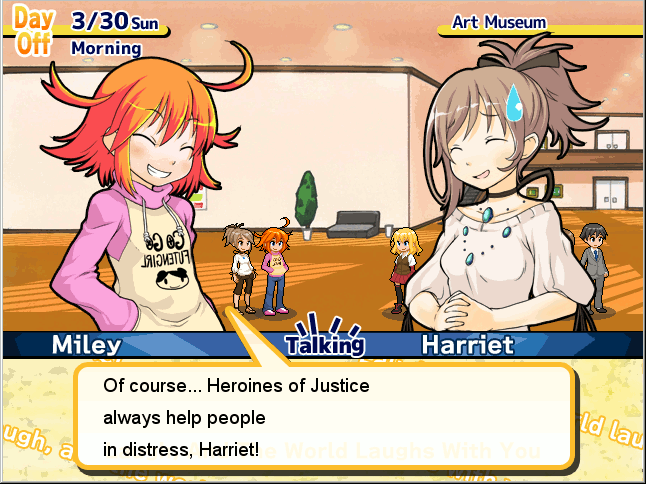
I won’t put her on a pedestal as a masterpiece of a character, but Miley’s earnest and energetic nature make her endearing and empathetic; she carries Cherry Tree High Comedy Club in every sense of the word. Every other character seems content with the routine and mundane until Miley’s talk of her dreams, her efforts to turn them into reality, and her warm personality come together to strike a chord on the strings of their hearts.
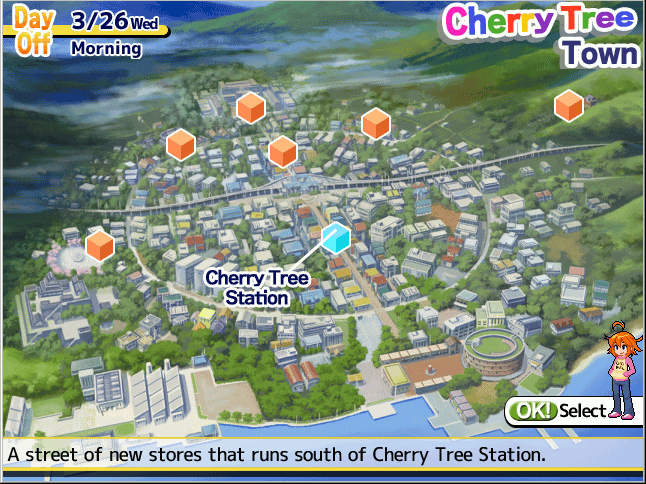
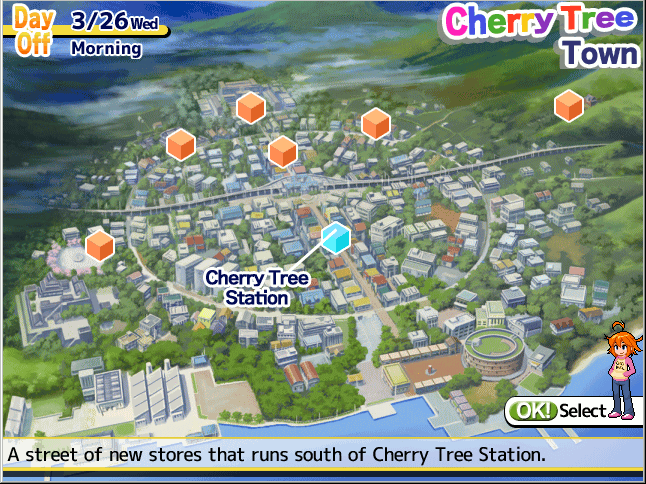
To be upfront, my description of the gameplay is probably more exciting to most readers than the gameplay itself. Story, artwork, and music are the primary focus; the player’s main role is picking one of several dots on the overworld and then jumping into one of half a dozen or so daily activities available at that location. If River City Ransom was entirely about wandering around and buying food and books, that would be the gameplay on tap here—talking to potential comedy club recruits boils down to finding the person and choosing a discussion topic from a menu, learning about topics is a matter of entering the right building or buying the right book, and earning money is a simple yes/no option.
As it turns out, I do enjoy this kind of gameplay in and of itself. It’s not mindblowing, but I liked Cherry Tree High Comedy Club while it lasted. The average person, though, should probably buy for either the story, just for experimentation (like in my case), or not at all.
I make it a point to keep this blog upbeat because I believe in the power of being positive, but since this is a review I’ll mention my one major criticism. The localization of Cherry Tree High Comedy Club constantly pretends to be something it’s not and I don’t understand why.
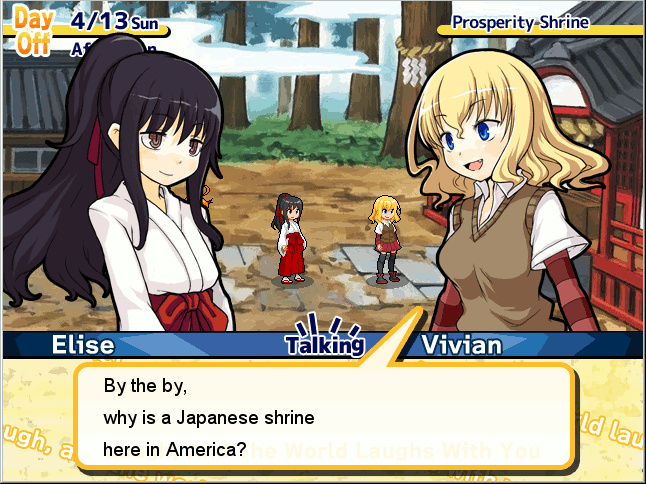
I know that some people will be upset by this. I don’t go that far, but I’m just dumbstruck to see a translation in 2012 pretending that the game is set in America. Even way back in 1998, anime fans had good laughs over the Pokémon TV show calling a rice ball a jelly donut. Cherry Tree High Comedy Club is billed as an “anime adventure game” and it’s a perfectly fine one, so why hide its Japanese heritage?
It would be one thing if the above was a single throwaway line, but there’s a purple elephant in the corner when even the item descriptions try to reinforce that the characters are in America all while there’s a Japanese shrine in town, Miley talks about how anime characters only wish they had her hair, girls wear schoolgirl outfits and guys wear suits in the high school hallways, two characters mention maid cafes, the heroine and the local kids watch a show called Hero Rangers and later Sailor Princess, and the cast explicitly tells a foreign girl that Cherry Tree Town is an American sister city of a Japanese town.
I’ve had an editorial about localization changes in mind for a while and I’ll save that for another day, but in short, I don’t oppose change on principle and I don’t even necessarily oppose “unnecessary” change. What I do oppose is the most baffling type of localization: a self-defeating one. Cherry Tree High Comedy Club is an indie game in a niche genre that’s published by Capcom and sold exclusively through digital distribution for the price of $7.99. Even hearing of this game, never mind being inclined to buy it, practically requires that a person be a diehard gamer who knows and loves at least a few of the following Japanese people, characters, shows, or names: Shigeru Miyamoto, Akira Toriyama, Hideo Kojima, Hironobu Sakaguchi, Masahiro Sakurai, Nobuo Uematsu, Koji Kondo, Keiji Inafune, Ryu, Akuma, Sakura, Makoto, Dragonball, Sailor Moon, One Piece, Bleach, Naruto, Kanto, Johto, and Pikachu.
CTHCC is a game with exactly the kind of buyer demographic that would revel in its Japanese qualities. If anything, I could see people being put off by a game that seems ashamed or afraid to acknowledge its roots and embrace its identity. I believe that would be their loss, but I would understand their stance. A real bummer from this is that one of the menu screens outright shows a “To be continued…” that teases a sequel, presumably taking place after Miley has her comedy club up and running; if that game is released, the translation will be in a no-win position of either flipping character names that people have gotten used to or sticking with the America conceit and hoping that nothing in the story depends on the game being set in Japan.
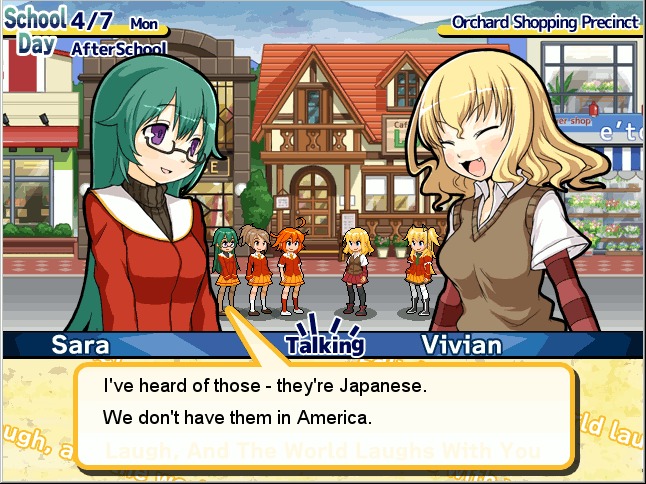
Sara explains to Swedish foreigner Vivian that America doesn’t have maid cafes. Most of America doesn’t have cherry blossoms either, but Cherry Tree High Comedy Club kept its title. Why change anything else?
All told, I had a good six hours with Cherry Tree High Comedy Club grinding stats through dialogue boxes until I earned the best ending. I think of it more as a story than a game: a story of friendship, innocence, and how one girl with a big heart can draw in the entire town around her. It might be a little cheesy, but I like a side dish of cutesy cheddar every now and then.
Or maybe more often than not.
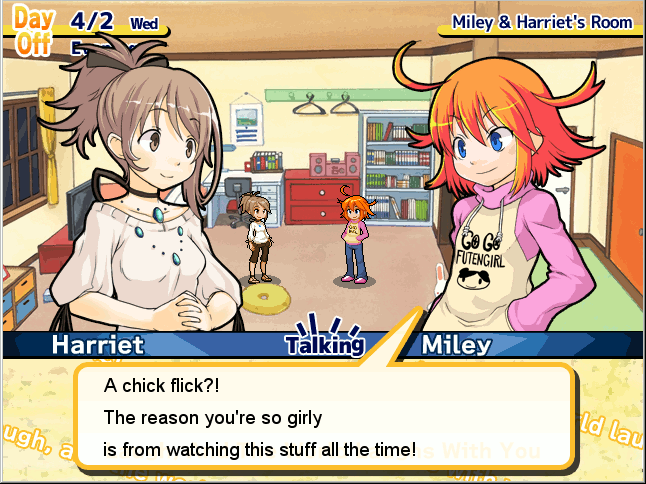

Pingback: What’s In A (Changed For Localization) Name? | Game Design and Deconstruction